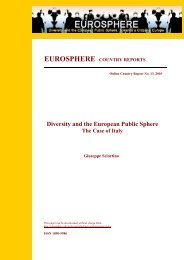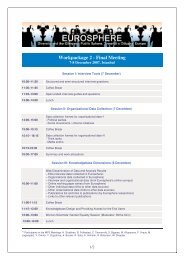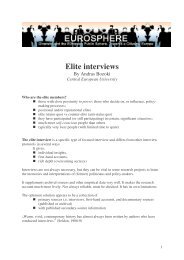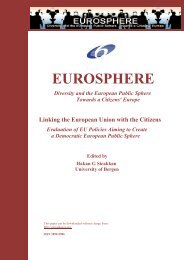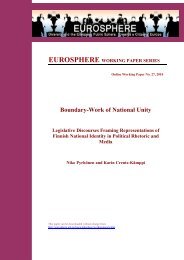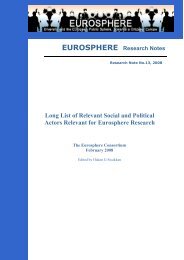Migrants, Minorities, Belongings and Citizenship. Glocalization and ...
Migrants, Minorities, Belongings and Citizenship. Glocalization and ...
Migrants, Minorities, Belongings and Citizenship. Glocalization and ...
Create successful ePaper yourself
Turn your PDF publications into a flip-book with our unique Google optimized e-Paper software.
African music club, etc.). Intercultural sites are still relatively<br />
underdeveloped, or hidden, or based on quickly changing constellations<br />
of informal networks. (Bozóki <strong>and</strong> Bösze 2004:135-136)<br />
In the Hungarian report, Bozóki <strong>and</strong> Bösze report four different types of a glocal site: (1)<br />
professional, (2) leisure, (3) cultural/social, <strong>and</strong> (4) friendship. Concerning the fourth<br />
category, they report that<br />
Many glocal sites are not really permanent sites but rather glocal<br />
activities which are based on friendships <strong>and</strong> informal relationships.<br />
Those were started as occasional events but became less regular<br />
activities/sites. Their survival solely depends on the willingness of<br />
people to keep them alive. […] Here, primarily, activity shapes the<br />
chance for participation in decision-making processes. Those who come<br />
regularly can naturally be able to participate in decision-making without<br />
any formal ‘legitimacy’. (Bozóki <strong>and</strong> Bösze 2004:136-37)<br />
The third model comprises countries where politics <strong>and</strong> public spaces are premised upon<br />
one or another sort of homogeneity, from which some persons feel a need to escape – as<br />
expressed by many respondents in Austria, Denmark, Finl<strong>and</strong>, <strong>and</strong> Norway. The glocal<br />
sites in Vienna, Copenhagen, Helsinki <strong>and</strong> Bergen proved to be more institutionalized<br />
than those in Budapest <strong>and</strong> Tallinn. According to Fischer,<br />
[WUK] is the largest of such sites in Vienna, it has a reputation of<br />
cultural diversity <strong>and</strong> it is renowned for its alternative grassroots system<br />
of decision making (Fischer et al. 2004:40).<br />
This description of the glocal site in Vienna also illustrates the policy-relevancy of glocal<br />
sites. The situation in the other three countries is not much different. Masoud<br />
Mohammadi, a musician <strong>and</strong> user of the Nørre Allé Medborgerhus in Copenhagen, wrote<br />
in a local newspaper chronicle,<br />
Today, after ten years’ efforts by the users, workers, <strong>and</strong> administrators<br />
in this place, the ‘House’ has developed to become one of the most<br />
active <strong>and</strong> fascinating sites in the capital. A ‘house’ which Copenhagen<br />
inhabitants can all be proud of, no matter which ethnic background they<br />
may have. 3<br />
3 Chronicle by Masoud Muhammadi in PåGaden, 10. årg. (2003), No.5 (my translation from Danish). The name<br />
of the newspaper in English would be “on the street”.<br />
58



